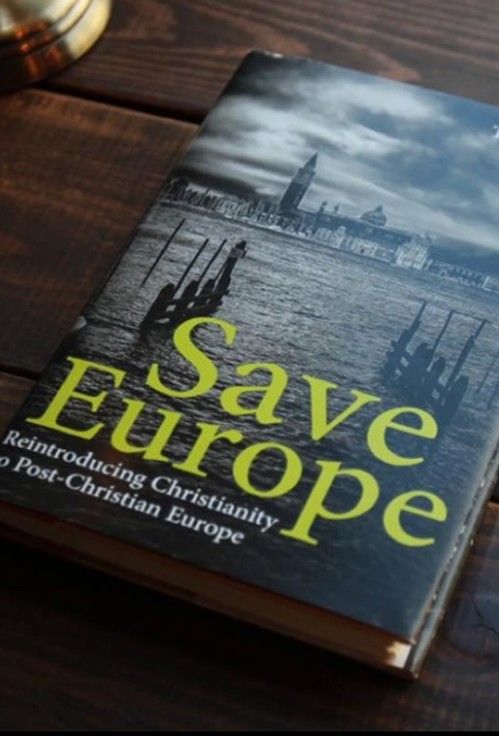"Save Europe: Reintroducing Christianity to Post-Christian Europe"

A Korean missionary to Croatia once told me about the umbrage many Croatians felt upon seeing that an Asian was trying to tell them about the God of the Bible. It was as if the Croatians felt, “How many years have you Koreans had the gospel in your country? We have had it for more than a thousand years.” Recently, a pastor friend in Korea, Ted Kim, published a book entitled, “Save Europe: Reintroducing Christianity to Post-Christian Europe,” as a prelude to moving there as a missionary. (To do so, Pastor Ted took an early retirement from his large church he founded over 20 years ago.) I am certain that Ted, once in Europe, is going to get his share of “Hey, what are you doing here?
So, is Pastor Ted’s contention true, that Europe is spiritually lost? He is certainly not alone in that regard, for many concerned observers have long noted a state of unprecedented spiritual lethargy plaguing this continent. This is to say, Europe is a post-Christian continent, teeming with nominal Christians who are, no doubt, the most secularized people in the world (i.e., children of this age who have no great yearning for anything beyond this world).
Europe has long rejected its Christian mooring for several reasons. First, historically, the marked past of Roman Catholic Church responsible for cruelty against Muslims, Jews, Protestant and Orthodox Christians (mainly through the Inquisition and Crusades), on the one hand, and several religious wars (like the bloody Thirty Years’ War: 1618-48), on the other, have caused Europeans to develop allergic reactions to religion itself. Second, philosophically, the triumph of the Enlightenment humanism in the 18th century (reason over faith), German rationalism in the 19th century ("God is dead"), and scientism in the 20th century (science over religions), has culminated in theological liberalism that has long reduced the Bible as a book of pious legends and fables. Third, economically, Europe’s lack of need for God has certainly been compounded by its economic affluence.
Now, after the fall of the Eastern Europe in 1989-90, evangelical churches were excited because the door had finally opened for missionaries to enter this previously closed region to evangelize. In the middle of 2000, a good friend who had previously taught theology at a seminary in Czech Republic (and at the time was teaching in Belgium) informed me that “just in ten years after the door opened for the gospel in Czech Republic as well as in other Eastern Europe nations, liberal theology from the Western Europe has deeply penetrated into both churches and protestant seminaries.” In this respect, a door for effective evangelization may be almost closed over in Eastern Europe, as it already has in Western Europe.
Having said that, we should also note that pockets of revival have broken out in different parts of Europe over the years, like in England and France, but not enough to significantly increase the evangelical population in Western Europe. Some years back, the percentage of evangelicals (i.e., those who believe that salvation is through faith in Jesus, the Bible as the Word of God, etc.) in England hovered around 3-4%; in France it was less than 1%; in Germany only about 4% of the Protestants attended church weekly; Eastern European country like Croatia, the percentage of evangelical was around 0.2%. Those numbers, I am sure, have not improved over the years.
In particular, what has happened to England is quite stunning, since this is the country that produced great missionaries such as William Carey (India), Hudson Taylor (Inland China), and David Livingstone (Inland Africa). However, two generations removed from these men, England has become a mission field. As early as the 1980s, studies indicated some disturbing signs about this country. It was found that 50% of the Londoners never read the Bible; the national rate was 33%. Even more shocking was that 96% of the Londoners never attended church. A supply of trained pastors was so short in some denominations, such as The United Free Church of Scotland (which had sent out Livingstone), that they had to recruit pastors from Africa.
However, the biggest concern for this continent is the ubiquitous presence of Muslims, for Islam is the fastest-growing religion in Europe. In England, empty churches are being bought by the Muslims, who then turn them into mosques. In the early 2000s, it was estimated that close to 40 million Muslims lived in Europe and Russia. That number has surely risen since then due to immigration and high birthrates. The very low and untenable birthrate of the Europeans necessitates the presence of Muslims who fill their labor gap, and once there, they procreate at an amazing rate. “The Islamic community throughout the world is out-reproducing Christians and Jews almost seven to one” (Gabriel 2006:23). Therefore, the tripling of the Muslim population in Europe in the last forty years should not be a surprise. And that's how Lebanon, once the only majority Christian nation in the Middle East (in fact, in all Asia) became a Muslim dominated nation. This sobering reality, no doubt, adds a whole new dimension—that of apologetics and comparative religion—to the task of re-evangelizing Europe, making it that much more challenging and difficult.
So, here is hoping that many faithful and able believers, following in the footsteps of Pastor Ted Kim, will “reintroduc[e] Christianity to Post-Christian Europe” through a clear articulation of the gospel and biblical worldview in the power of the Holy Spirit.
So, is Pastor Ted’s contention true, that Europe is spiritually lost? He is certainly not alone in that regard, for many concerned observers have long noted a state of unprecedented spiritual lethargy plaguing this continent. This is to say, Europe is a post-Christian continent, teeming with nominal Christians who are, no doubt, the most secularized people in the world (i.e., children of this age who have no great yearning for anything beyond this world).
Europe has long rejected its Christian mooring for several reasons. First, historically, the marked past of Roman Catholic Church responsible for cruelty against Muslims, Jews, Protestant and Orthodox Christians (mainly through the Inquisition and Crusades), on the one hand, and several religious wars (like the bloody Thirty Years’ War: 1618-48), on the other, have caused Europeans to develop allergic reactions to religion itself. Second, philosophically, the triumph of the Enlightenment humanism in the 18th century (reason over faith), German rationalism in the 19th century ("God is dead"), and scientism in the 20th century (science over religions), has culminated in theological liberalism that has long reduced the Bible as a book of pious legends and fables. Third, economically, Europe’s lack of need for God has certainly been compounded by its economic affluence.
Now, after the fall of the Eastern Europe in 1989-90, evangelical churches were excited because the door had finally opened for missionaries to enter this previously closed region to evangelize. In the middle of 2000, a good friend who had previously taught theology at a seminary in Czech Republic (and at the time was teaching in Belgium) informed me that “just in ten years after the door opened for the gospel in Czech Republic as well as in other Eastern Europe nations, liberal theology from the Western Europe has deeply penetrated into both churches and protestant seminaries.” In this respect, a door for effective evangelization may be almost closed over in Eastern Europe, as it already has in Western Europe.
Having said that, we should also note that pockets of revival have broken out in different parts of Europe over the years, like in England and France, but not enough to significantly increase the evangelical population in Western Europe. Some years back, the percentage of evangelicals (i.e., those who believe that salvation is through faith in Jesus, the Bible as the Word of God, etc.) in England hovered around 3-4%; in France it was less than 1%; in Germany only about 4% of the Protestants attended church weekly; Eastern European country like Croatia, the percentage of evangelical was around 0.2%. Those numbers, I am sure, have not improved over the years.
In particular, what has happened to England is quite stunning, since this is the country that produced great missionaries such as William Carey (India), Hudson Taylor (Inland China), and David Livingstone (Inland Africa). However, two generations removed from these men, England has become a mission field. As early as the 1980s, studies indicated some disturbing signs about this country. It was found that 50% of the Londoners never read the Bible; the national rate was 33%. Even more shocking was that 96% of the Londoners never attended church. A supply of trained pastors was so short in some denominations, such as The United Free Church of Scotland (which had sent out Livingstone), that they had to recruit pastors from Africa.
However, the biggest concern for this continent is the ubiquitous presence of Muslims, for Islam is the fastest-growing religion in Europe. In England, empty churches are being bought by the Muslims, who then turn them into mosques. In the early 2000s, it was estimated that close to 40 million Muslims lived in Europe and Russia. That number has surely risen since then due to immigration and high birthrates. The very low and untenable birthrate of the Europeans necessitates the presence of Muslims who fill their labor gap, and once there, they procreate at an amazing rate. “The Islamic community throughout the world is out-reproducing Christians and Jews almost seven to one” (Gabriel 2006:23). Therefore, the tripling of the Muslim population in Europe in the last forty years should not be a surprise. And that's how Lebanon, once the only majority Christian nation in the Middle East (in fact, in all Asia) became a Muslim dominated nation. This sobering reality, no doubt, adds a whole new dimension—that of apologetics and comparative religion—to the task of re-evangelizing Europe, making it that much more challenging and difficult.
So, here is hoping that many faithful and able believers, following in the footsteps of Pastor Ted Kim, will “reintroduc[e] Christianity to Post-Christian Europe” through a clear articulation of the gospel and biblical worldview in the power of the Holy Spirit.
Recent
What I Won’t Say to the Lord in My Prayer for Healing of Pastor Eddie
January 25th, 2023
How Would You Respond to Those Who Say, “You Cannot Trust the Gospel Accounts?"
September 2nd, 2022
Should the Church Celebrate, Lament or Be Silent Over the Recent Abortion Verdict?
July 1st, 2022
“Contradictions” in the Bible: How Do I Make Sense of Them?
June 22nd, 2022
Is There Hope for Ukrainian Refugees?
April 5th, 2022
